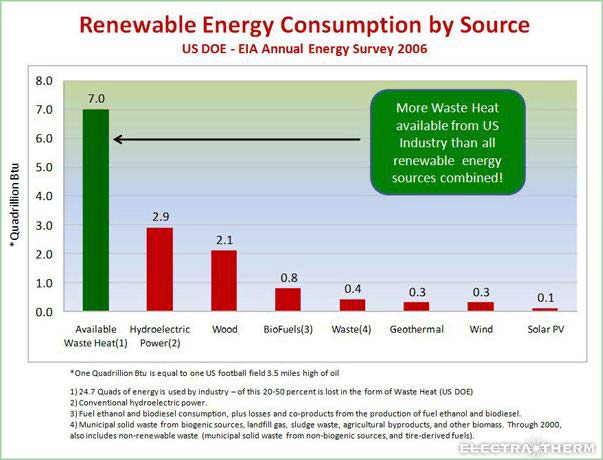If harnessed, the waste heat from industrial processes in the United States alone can provide over 10 gigawatts of clean electricity – enough to power over 10 million American homes and save U.S. industries over $3,000,000,000 annually while creating as many as 160,000 jobs.
According to the United States Department of Energy, there is more waste heat available in the United States than all other sources of renewable energy combined. Recycled energy is one of the world’s best sources for fuel-free, clean and inexpensive energy.
Employed on a wide scale, recycled energy gleaned from waste heat could generate the equivalent of ninety-two, 500MW gas-fired combined cycle plants without any fuel consumption. The combined heat and power or heat to power industry has the chance to transform our national energy output while protecting the environment.
In particular, the oil and gas industry, coal-fired power plants, geothermal/hydrothermal sources, stationary engines and industrial processes create enormous amounts of surplus energy that is discharged into the atmosphere in the form of waste heat. At Gulf Coast Green Energy, we believe waste heat is a renewable resource and an important recycled energy option. Turning waste heat into electricity will reduce the consumption of fossil fuels, improve energy security and limit our impact on the environment.

For more information about why recycled energy in the form of waste heat should be considered a renewable resource, contact us.
Economic Benefit of Converting Heat to Power
Reduced fuel consumption
- Lower fuel costs
- Lower transportation costs
- Lower operating and maintenance costs
Utilizes waste heat to enhance the economic efficiency and competitiveness of utility companies and host manufacturing facilities
- Strengthens this key economic sector
- Protects the high-value jobs it provides
Waste heat to power equipment produces the same number of kilowatts generated by conventional electric generator plants, but can cost as little as one-third of the cost to construct!
Environmental and Health Benefits of Turning Heat to Power
Emissions free
- We utilize waste heat to harvest more energy per unit of fuel via a closed system with no exhaust
- Reduce net total pollutants and greenhouse emissions which enhances your company’s ability to meet current and future state and federal air quality standards
- Reduced emissions result in improved health and welfare impacting the cost benefits to your community
Turn Waste Heat to Power for Added Security Benefit
Reduce risk and downtime
- The more energy that is created onsite means less purchased energy from a secondary source
- In the event of major grid failure, on site power systems will continue to operate
